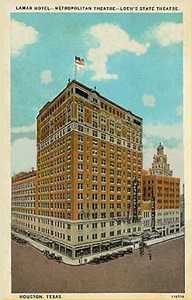Houston Lamar Hotel Suite 8-F Unofficial Capital of Texas. (original) (raw)
If you visit the Heritage Society's Museum in downtown Houston, take notice of the hotel key on display.
The key unlocked the door to the Lamar Hotel's Suite 8-F, which played a key role in Houston and Texas' growth and development.
Often referred to as the "unofficial capital of Texas," Suite 8-F (two rooms and a kitchenette leased to George Brown of Brown & Root Construction Company) was the meeting place for Houston's business leaders from the late 1930s to the 1960s.
 |
"Lamar Hotel - Metropolitan Theatre - Loew's State Theatre Houston, Texas" Postcard courtesy rootsweb.com/%7Etxpstcrd/ |
|---|
The core of the group included Jesse H. Jones, Herman and George Brown, Gus Wortham, James Abercrombie and James A. Elkins Sr. -- all of whom founded successful corporations and acquired considerable wealth.
But little mention is ever made of a small circle of East Texans who were also regarded as Suite 8-F power brokers when it came to Texas politics.
That list included Texas Governor Allan Shivers of Woodville, attorney and LBJ confidant Ed Clark of San Augustine; Ben Ramsey, also of San Augustine, who ran the Texas Senate with an iron hand for decades; Ottis Lock of Lufkin, often regarded as the key strategist for Ramsey and Shivers; and Wardlow Lane, a powerful Senator from Center.
Houston's 8-F players were smart enough to know they needed the help of the powerful East Texas group, so they often invited them to join them at the Lamar, where decisions were made that shaped Texas' future and its economic course.
The 8-F players also had connections to East Texas beside those with the region's politicians
Jones was a lumber entrepreneur who started his career as manager of his uncle's lumber company. He also owned the Houston Chronicle, which was known for its legions of East Texas newspapermen, including Clayte Binion and Morris Frank, both of Lufkin.
Brothers Herman and George Brown built their small construction firm, Brown and Root, into one of the world's largest construction firms. George Brown also served as a director of Southland Paper Mills, Inc. of Lufkin.
Wortham, founder of American General Insurance Co., was a cousin of Dick Wortham, a Southland president, and Abercrombie's Cameron Iron Works had links with many East Texas oilfield suppliers.
Judge Elkins, a founder of both the Vinson and Elkins law firm and the forerunner of First City Bancorporation, served as the director of multiple banks, railroads, oil companies and insurance firms, many of which did business in East Texas. Elkins Lake, near Huntsville, owes its name to the lawyer/banker.
Frequently recognized as part of the group were Polk County native and former Governor William P. Hobby, who controlled The Houston Post, KPRC-TV and KPRC radio. The 8-F crowd exercised a strong influence in Texas politics. Not only did they raise money for candidates, but the endorsement of the 8-F crowd mean that the candidate had the general approval of the Texas business community. Their influence extended into Washington through their association with politicians such as John Nance Garner, Sam Rayburn, Lyndon Johnson, and Albert Thomas.
The 8-F power brokers are all gone today and the site of the Lamar Hotel is a parking lot. But the tales of what transpired behind the doors of Suite 8-F have become an integral part of Houston and East Texas history.
June 26, 2006 Column
Published with permission
Texas Escapes, in its purpose to preserve historic, endangered and vanishing Texas, asks that anyone wishing to share their local history, stories, landmarks and vintage/historic photos, please contact us.